Crisis therapists cleared their schedules to help MSU students, faculty
While a gunman rained terror down on Michigan State University's campus Monday night, forcing students, faculty and staff into hiding, the dean of the school of human medicine quickly began lining up help to manage the mental health fallout that he knew would follow.
"We were getting texts from the dean of the medical school, Dr. Aron Sousa, as soon as 10:30 or 10:40 Monday night," said Dr. Bill Sanders, chief medical officer of Pine Rest Christian Mental Health Services in Grand Rapids. At that time, the campus was still under a shelter-in-place order and the suspected gunman had not been found.
"He reached out to say: 'What type of services do you have available should students, faculty or employees at MSU need help or support?' I give a lot of credit to him for thinking ahead. ... We jumped on it right away," Sanders said, working through the night with colleagues to line up mental health providers who could help.
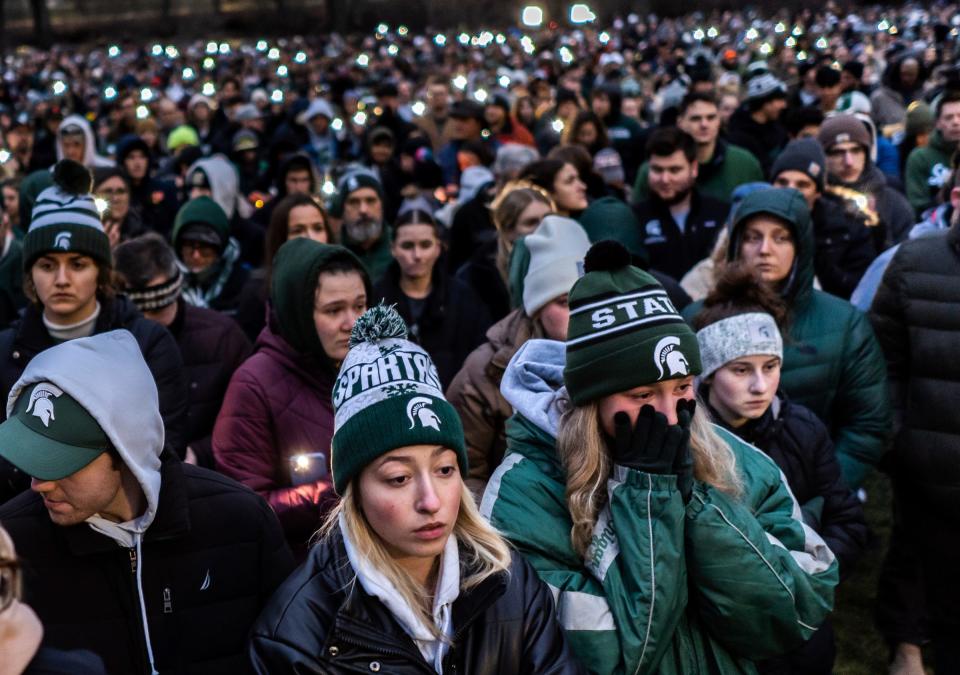
"It was really kind of amazing," he said. "Almost everybody we talked to said, 'Hey, you know what? I'll open up my schedule. I can make appointments immediately available for anybody who is really struggling.' We were able to get 20 specially trained crisis therapists to open up their schedules to provide immediate appointments for students and faculty."
More:After Michigan State mass shooting, more questions than answers
More:Thousands fill heart of MSU's campus for solemn vigil marked by silence
'Everybody has stepped up. We are hurting'
In the days since the attack, countless others also heeded the call to offer all the mental health support and other assistance they can in MSU's time of need.
"It is amazing how on such a short notice, all the services have been pulled together, how we have come together as a family, as a community — from administration to the police force to students, student groups, multiple organizations, faith communities," said Dr. Farha Abbasi, an assistant professor in the psychiatry department at MSU.
"Everybody has stepped up. We are hurting. We're hurting really bad, but at the same time, it's healing to feel the gratitude of being at this campus and being in this kind of environment. ... Now, when we say Spartan Strong, it has just such a depth to it. We are grieving. The loss is huge, but this gives us hope that we can come together and heal."
Help ranges from MSU resources to FBI specialists to comfort dogs
The university leveraged its own psychiatric and counseling services, and has a 24-hour crisis line at 517-355-8270 (press 1 at the prompt). In-person counseling sessions are available at Akers Hall, the Hannah Community Center, the Office of International Students and Scholars, and the Mobile VA Vet Center.
The FBI brought in victim specialists from around the country to help the students who were in Berkey Hall and the MSU Union at the time of the shooting. Comfort dogs made a visit to campus as well, said James Tarasca, FBI special agent in charge.
"I want to thank the community, especially those who brought comfort dogs," Tarasca said at a Thursday morning news briefing. "It went a long way. It meant a lot to students and our folks as well. The comfort dogs, they bring a lot."
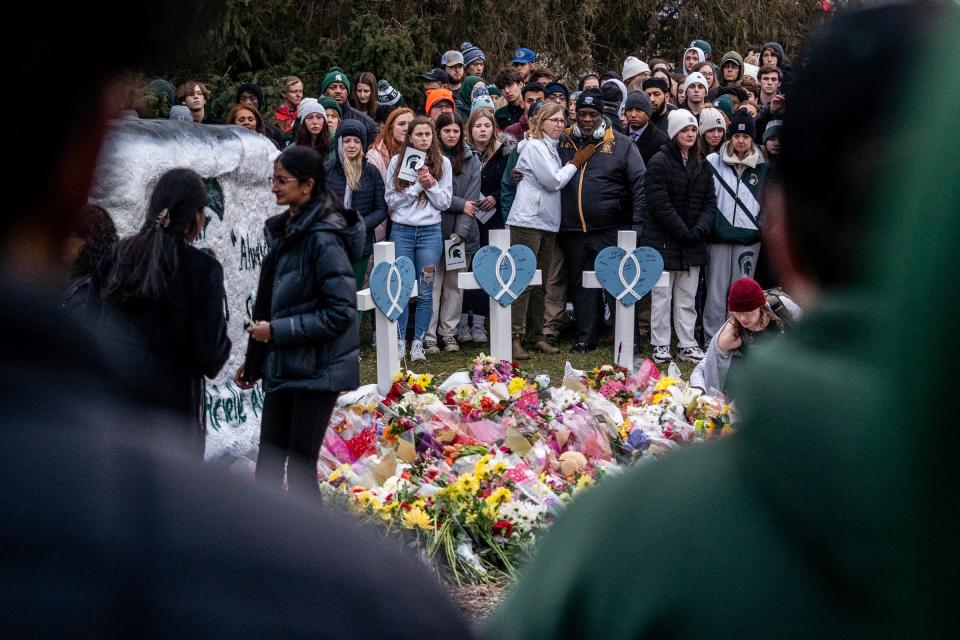
'None of us have all the answers, but we do have each other'
Interim MSU President Teresa Woodruff said that although campus operations reopened Thursday and classes are to resume Monday, university leaders understand that each person's healing might be on a different timeline.
"I'm extremely grateful for the quick actions that we've had pulling together the many counseling and support services this week," she said.
"We know that many in the community will continue to need a services for months to come and that some haven't reached out yet. But I am encouraged ... and can report that hundreds of students have already utilized our counseling services that were provided at the Hannah Community Center or in our residence halls.
"We also provided a service to employees that is called Reflect and Connect, and we're ... looking into training for supervisors as more faculty and staff began returning to positions today and into next week. We are encouraging empathy and patience and an atmosphere for all to recover at their own pace and will continue to offer these services into the future."
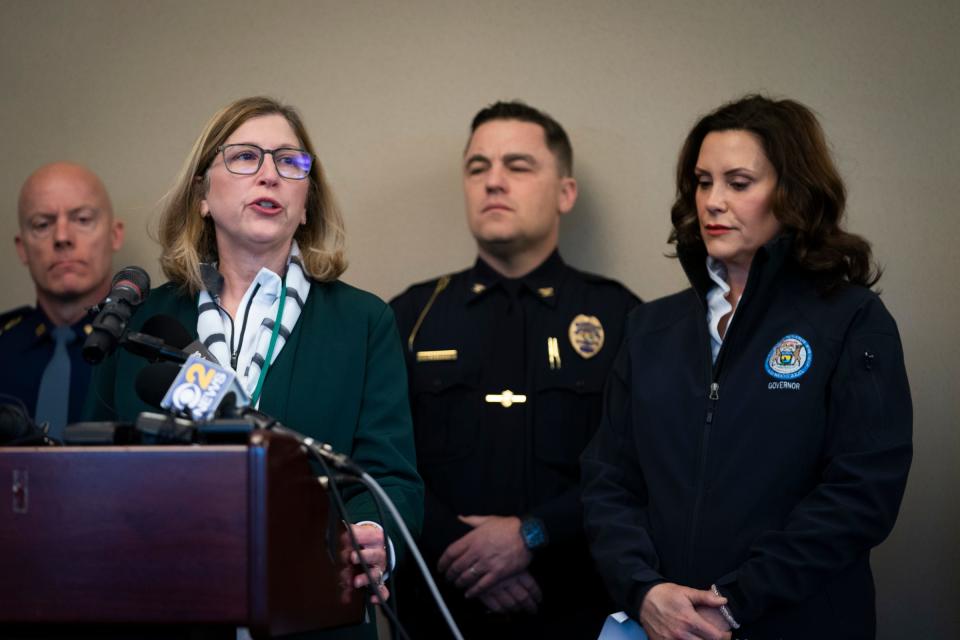
More:MSU shooting suspect had 2 handguns, extra ammo on him, police say
More:Michigan State University student: I survived Sandy Hook, now this shooting
The university has closed Berkey Hall for the remainder of the semester, she said. MSU leaders are still deciding when to reopen the MSU Union.
"We know as a campus that we have hard work ahead of us, Woodruff said. "Moving forward won't be easy. Unfortunately, others in higher education have been through this and we are connecting ... through these shared experiences. ... None of us have all the answers, but we do have each other."
Trauma can trigger anxiety, depression
Through a partnership with Pine Rest, Corewell Health's staff also joined the effort to provide mental health support to MSU, said Dr. Subodh Jain, division chief of psychiatry.
"Any kind of school shooting can cause significant trauma to those who are involved and affected by the incident — whether it's students or teachers, parents, and even the broader community," Jain said.
"The firsthand trauma happened to the people who were actually victims of the shooting, but also the ones who were involved with the lockdown, having to shelter in place and fearing for their life for many hours — that can really set off traumatic symptoms. Even the ones who were sitting at home, the parents, the ones who were watching it on TV, and people who have a history of trauma in their lives and background can have secondary trauma from these events.
"Many times, it can cause reactions ... like anxiety or depression, or acute stress reaction. If somebody has a history of PTSD, it can worsen their PTSD symptoms. It can cause sleeping or concentration challenges. People can become hypervigilant and easily react to certain sounds ... that are similar, even if they are watching it on TV in a different setting. Any pop can be perceived as a gunshot.
"It impacts everybody in one way or the other who are exposed to it."
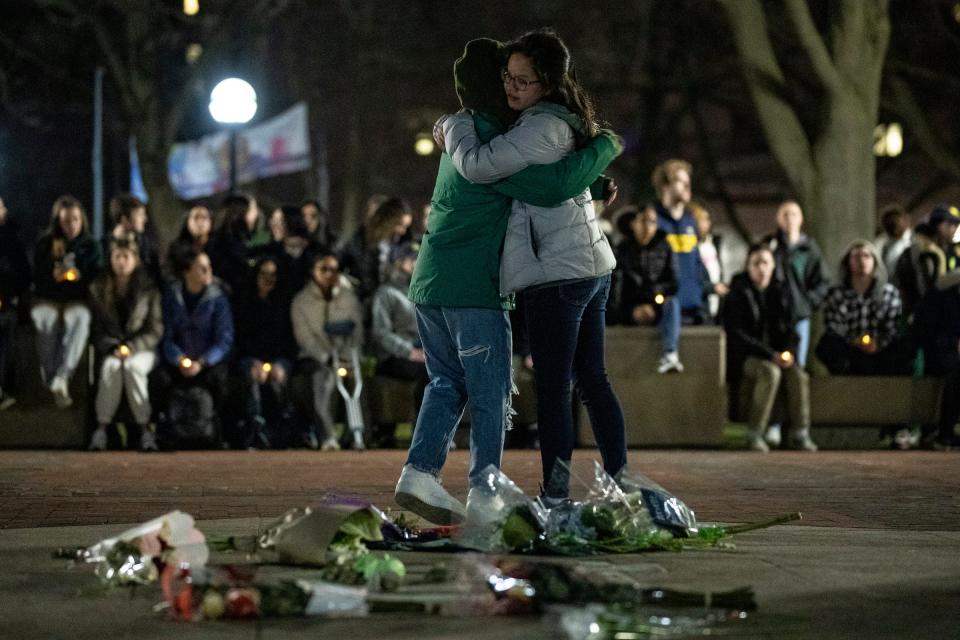
Some may go on to have PTSD
Some survivors may go on to develop post-traumatic stress disorder from it, Jain said, though it's difficult to predict who will and who won't have PTSD symptoms.
"This was definitely a life-threatening event when the shooter was not to be found and people did not know what to expect," he said. "I'm hearing stories that people were locked into their rooms or dorms for hours together without having the ability to use the restroom. Some took actions to protect themselves like locking them themselves in confined closets."
Symptoms of PTSD, he said, can include:
Flashbacks.
An exaggerated startle response and hypervigilance.
Nightmares.
Physical reactions such as increased heart rate, sweaty palms, constantly looking over your shoulder.
Support can help people cope with distress from the trauma, but Jain said, "it is definitely very challenging. Sometimes it can linger on for many, many years."
'You're not alone'
Having specially trained crisis counselors available to those in need is essential, Sanders said, to help people understand their symptoms and address them.
"Different people experience trauma differently," he said. "Eighty percent of us will experience a trauma and it will be traumatic, but we'll be OK. But then there's the other 20% that are going to have difficulty with sleep. They might have anxiety, panic attacks, GI (gastrointestinal) distress. They might start to isolate and they might not know why they're feeling funny or why they're feeling different.
"A crisis therapist helps them manage that moment. There can be all sorts of distorted thoughts that can happen ... because in reality, your world has just been just been shattered. You go from this place where you think you're safe, in a familiar environment and your life is good. Then, all of a sudden, your world has become chaotic and not a trusting place. And that just happened in a flash."
People who've survived other traumatic events are especially vulnerable, Sanders said.
"Something like this can can reignite or bring back some of those old traumas as well," he said. "And so it's important to be able to work with people to make sure they're using positive coping skills to move forward because ... sometimes we just revert back to older bad habits. For some individuals, that can mean turning to alcohol or drug use or isolating. ... That just wouldn't be very helpful to develop the skills they need to move forward."
It's also important for people to know they're not alone, Sanders said.
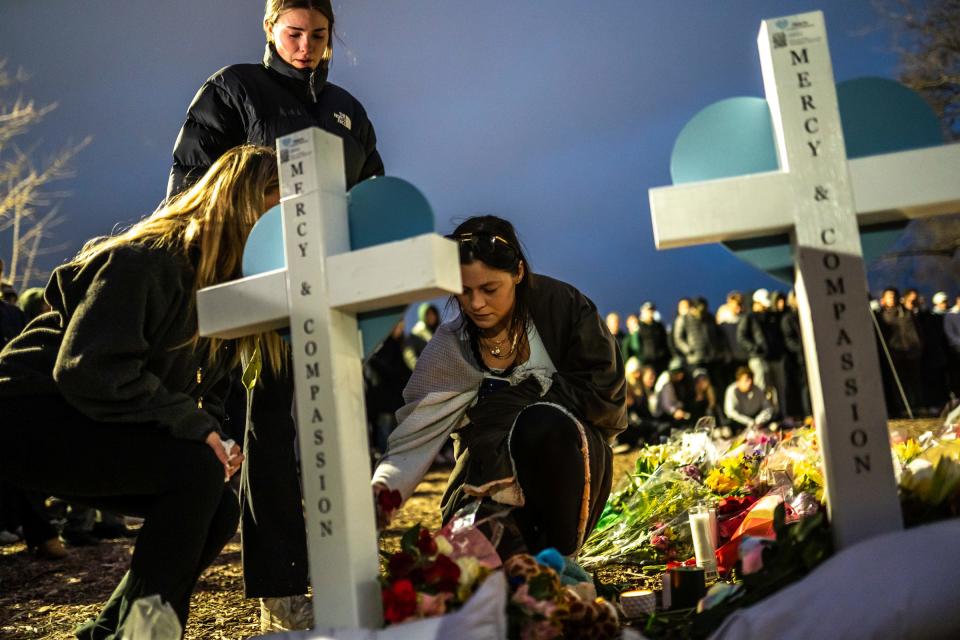
"It can be difficult to reach out for help," he said. "Sometimes, you can feel invincible when you're young or in college and there can be a stigma around mental health. But we just want to let everybody know you're not alone. There is no need to suffer in silence or alone. We're happy to help."
Not just in East Lansing, but all over the state.
"We all have become Spartan nation overnight, all over Michigan," said Abbasi, who also is a psychiatrist at McLaren Greater Lansing hospital and serves on a mental health task force for the city of Lansing. "When you see this humanity rise in a moment of crisis, your faith is restored. That's how we all will get through. I feel like we are one Michigan."
How to get help
Crisis counseling for the MSU community is available 24 hours a day by calling 517-355-8270 (press 1 at the prompt). In-person sessions are available at the following locations:
Office of International Students and Scholars, 427 North Shaw Lane, East Lansing, from 12:30-5:30 p.m. for students, faculty and staff.
Akers Hall, Room 137, 908 Akers Road, East Lansing, 12:30-5:30 p.m. for students.
Hannah Community Center, 819 Abbot Road, East Lansing, 12:30–5:30 p.m. for families and community members. (However, students, faculty or staff will not be turned away if they seek help here.) The Capital Area Transportation Authority is running a small bus to provide transportation from the Shaw Ramp to the Hannah Community Center and back.
The Mobile VA Vet Center will offer drop-in, confidential counseling for military veteran students, staff and faculty from 10 a.m.-7 p.m. Thursday, Friday and Saturday at the MSU Federal Credit Union's Farm Lane branch at 4825 Mount Hope Road, East Lansing.
Additionally, any Michigander in need of counseling or mental health support can get assistance from the United Way by calling 211.
Reflect and Connect sessions, along with resilience training, is available to MSU faculty, staff and graduate students as well. You can register here online.
The MSU ThrivingCampus website also offers students, faculty, staff, families and community members access to see off-campus mental health options. Go to msu.thrivingcampus.com to learn more. Additional crisis resources are available on the university's crisis website: https://caps.msu.edu/emergency.
Contact Kristen Jordan Shamus: kshamus@freepress.com. Follow her on Twitter @kristenshamus. Subscribe to the Free Press.
This article originally appeared on Detroit Free Press: Crisis therapists cleared their schedules to help MSU students, faculty

